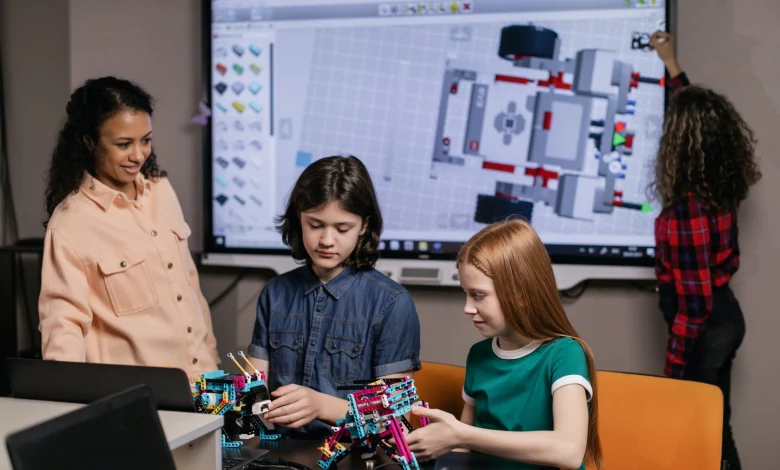Utilizing Technology in Education: Tools and Resources for International Students

Table of Contents
Introduction
In today’s digital age, technology has become an indispensable tool in the realm of education, revolutionizing the way knowledge is imparted and acquired. This paradigm shift holds particular significance for international students, who often encounter unique challenges in navigating educational systems in foreign countries. With the advent of various technological innovations, the landscape of education has evolved, offering a plethora of tools and resources tailored to meet the diverse needs of international learners.
Online Learning Platforms
One of the most prominent advancements in education is the proliferation of online learning platforms. From established platforms like Coursera and Udemy to specialized ones like Duolingo and Khan Academy, these platforms offer a vast array of courses covering a wide range of subjects. For international students, these platforms provide flexibility and accessibility, allowing them to pursue their educational goals from anywhere in the world, overcoming barriers of time and geography.
Educational Apps
In addition to online platforms, educational apps have emerged as invaluable resources for international students. Whether it’s language learning apps such as Rosetta Stone or productivity apps like Evernote, these tools cater to diverse learning needs. With features like interactive lessons, quizzes, and progress tracking, educational apps offer a dynamic and engaging learning experience, enhancing the academic journey of international students.
Virtual Reality (VR) in Education
The integration of virtual reality (VR) technology into education has opened up new avenues for immersive learning experiences. Through VR simulations and virtual field trips, international students can transcend geographical boundaries and explore diverse cultures and environments. Moreover, VR enhances conceptual understanding by providing interactive visualization tools, making complex concepts more tangible and comprehensible.
Artificial Intelligence (AI) in Education
Artificial intelligence (AI) has revolutionized education by personalizing the learning experience for students. Through adaptive learning algorithms, AI analyzes individual learning patterns and adapts instructional content accordingly, catering to the specific needs and pace of international students. Additionally, AI-powered tutoring systems offer real-time feedback and assistance, augmenting the efficacy of online education for international learners.
Digital Libraries and Resources
The digitization of libraries and academic resources has democratized access to knowledge for international students. With online repositories and databases, students can access a wealth of scholarly articles, e-books, and research papers, regardless of their geographical location. This abundance of digital resources empowers international students to conduct comprehensive research and stay abreast of the latest developments in their respective fields.
Collaboration Tools
Collaboration is a cornerstone of modern education, and technology has facilitated seamless collaboration among international students. From video conferencing tools like Zoom to collaborative platforms like Google Workspace, these tools enable students to collaborate on projects, participate in group discussions, and exchange ideas in virtual environments. By fostering a sense of community and teamwork, collaboration tools enrich the educational experience for international students.
Language Learning Software
For international students grappling with language barriers, language learning software offers a lifeline. Whether it’s mastering a new language for academic purposes or improving communication skills for social interactions, language learning software provides personalized lessons and interactive exercises tailored to individual proficiency levels. With features like speech recognition and language immersion, these software programs accelerate language acquisition and fluency.
Adaptive Learning Platforms
Adaptive learning platforms leverage data analytics and machine learning algorithms to deliver personalized learning experiences. By assessing students’ strengths, weaknesses, and learning styles, these platforms dynamically adjust the difficulty and pace of content delivery, ensuring optimal comprehension and retention. For international students adapting to unfamiliar academic environments, adaptive learning platforms offer tailored support and guidance, facilitating smoother transitions and academic success.
Cloud Computing in Education
Cloud computing has revolutionized the way educational resources are stored, accessed, and shared. By migrating educational materials to cloud-based platforms, institutions can streamline administrative processes, enhance data security, and promote collaboration among students and faculty. For international students, cloud computing ensures seamless access to course materials and collaborative tools, irrespective of their location or device.
Gamification in Education
Gamification has emerged as a powerful tool for engaging international students in the learning process. By integrating game elements such as points, badges, and leaderboards into educational activities, instructors can incentivize participation and foster a competitive spirit. Moreover, gamification enhances motivation and retention by making learning fun and interactive, catering to the diverse preferences and learning styles of international students.
Cybersecurity Measures
As education increasingly relies on digital technologies, cybersecurity has become a paramount concern for international students. From safeguarding personal data to protecting against cyber threats, implementing robust cybersecurity measures is essential to ensure a safe and secure learning environment. International students must be educated about cybersecurity best practices and equipped with the necessary tools and resources to mitigate risks and safeguard their online privacy.
E-learning Accessibility
Ensuring e-learning accessibility is crucial for accommodating the diverse needs of international students, including those with disabilities. From designing inclusive course materials to implementing assistive technologies, educational institutions must prioritize accessibility to ensure equitable access to educational resources and opportunities. By fostering a culture of inclusivity and accessibility, institutions can empower international students to fully participate in the educational experience and realize their academic potential.
Remote Internship Opportunities
Technology has expanded the horizons of internships, offering remote opportunities for international students to gain valuable work experience from anywhere in the world. With virtual internships spanning various industries and sectors, international students can engage in meaningful projects, collaborate with professionals, and build their professional networks. Remote internships not only enhance students’ employability but also provide a glimpse into the global workforce, preparing them for diverse career paths and opportunities.
Conclusion
In conclusion, the integration of technology into education has revolutionized the learning landscape, offering a myriad of tools and resources to enhance the academic journey of international students. From online learning platforms and educational apps to virtual reality and artificial intelligence, technology has democratized access to knowledge, personalized learning experiences, and fostered collaboration and inclusivity in education. As international students navigate the challenges of studying abroad, leveraging technology can empower them to overcome barriers, expand their horizons, and achieve academic success.
FAQs
- How can international students benefit from online learning platforms? International students can benefit from online learning platforms by accessing a wide range of courses, enjoying flexibility in scheduling, and overcoming geographical barriers to education.
- Are educational apps effective for international students? Yes, educational apps can be highly effective for international students, providing interactive lessons, personalized learning experiences, and opportunities for skill development.
- What role does virtual reality play in education for international students? Virtual reality offers immersive learning experiences, allowing international students to explore diverse environments, engage with course material, and enhance conceptual understanding.
- How can international students ensure cybersecurity in online education? International students can ensure cybersecurity by using strong passwords, keeping software updated, avoiding suspicious links, and utilizing security tools such as antivirus software and virtual private networks (VPNs).
- Are remote internship opportunities beneficial for international students? Yes, remote internship opportunities provide international students with valuable work experience, professional networking opportunities, and exposure to diverse industries, enhancing their employability and career prospects.




